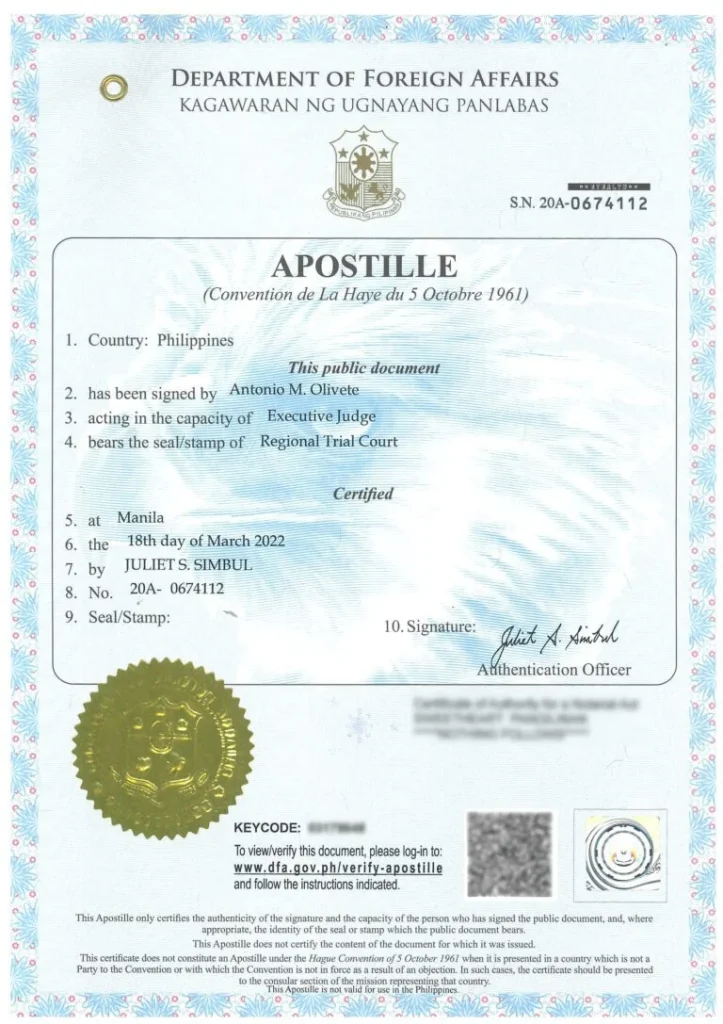Get Your
documents Apostilled in 3 days*!
*upon submission with the DFA
FileDocsPhil is a trusted & leading service provider that provides hassle-free assistance services in processing your documents. Our team has extensive experience in handling the apostille process, ensuring that your documents are authenticated and legalized for use abroad. Since the entire legalization process involves multiple steps, apostille should be approached diligently. Apostille services will vary depending on where you will use the document.
With our well-versed knowledge and expertise on the requirements and procedures from different countries, we are confident that we can provide quality service throughout the entire process, including the preparation of documents, obtaining the necessary certifications and notarizations, and submitting them to the appropriate authorities. We at FileDocsPhil will do our best to assist you with your request. We can guarantee fast, easy, accurate, and secure apostilled official documents.
Birth Certificates, Death Certificates, CENOMAR, Marriage Certificates, etc.
School records, Medical Records; Licenses, Certificate of Trainings etc.
Apostille is a certification that authenticates your documents for it to be valid and accepted abroad. Apostille has replaced the “red ribbon” way of authenticating a document. Apostille makes a document recognized as valid in countries included in the Hague Apostille Convention. An apostille is different from a notary. Recently, on March 19, 2024, the Department of Foreign Affairs Office of Consular Affairs (DFA OCA) launched the e-Apostilles ervice for apostille of PSA e-certificates.
However, for countries that are not part of the Apostille Convention, the authentication will go through the process of consular authentication, also known as Attestation or Embassy Legalization. It is processed within the consulate or embassy of the respective country where the document will be used.
In the Philippines, the apostille service provider will ask you to provide or accomplish the following:
• Authentication form
• Original and photocopy of a valid ID
• A digitized government-issued ID with signature
The following IDs are accepted: Passport, Voter’s ID, Solo parent ID, Senior citizen ID, PWD ID, Alumni or student ID, Seaman’s book
• If using an authorized representative, you will additionally need:
• Authorization letter
• Photocopy of the applicant’s ID
• Original SPA (specifically from the parent or legal guardian of a minor applicant)
The representative always needs to bring the letter, ID, and SPA, especially when transacting with the DFA.

Sample of apostilled document
As part of due diligence, it is critical that we, at FileDocsPhil, know where you will use the document and its intended use. Not all countries or territories are part of the Hague Apostille Convention and accept an apostilled document (with the stamp and gold round sticker). Some countries still require the authenticated document to be legalized within the consulate or embassy of the respective country located in the Philippines where the document will be used. This process is known as attestation or embassy legalization.
For the latter, these countries are: UAE, Austria, Finland, Germany & Greece
These countries do not acknowledge that the apostilled documents are legal and valid. Therefore, an additional authentication process is in line. After having your documents authenticated by the DFA, you still need to take your document(s) to the foreign embassy or consulate for legalization.
If your country is not here, see the complete list of countries that are part of Hague Apostille Convention that recognize apostille.
United Arab Emirates
United States of America
United Kingdom
Australia
Canada
Singapore
Japan
China
Republic of South Korea
Saudi Arabia
If your country is not here, see the complete list of countries that are part of Hague Apostille Convention that recognize apostille.
Obtaining the document(s) to be certified from the relevant government agency or entity
Taking the certified document(s) to the DFA for authentication
Taking the authenticated document(s) to the relevant embassy or consulate for legalization
Obtaining the document(s) to be certified from the relevant government agency or entity
Taking the certified document(s) to the DFA for authentication
Thereby, Apostille is faster than Attestation since the legalization process is no longer needed.
Need further information and assistance in Apostille process? Talk to our team at FILEDOCSPHIL to know more about the requirements and process. Call us today at (+63) 917 149 2337 or send an email to info@filedocsphil.com or simply message us through the live chat for more information.
Unit 604 The Infinity, 26th Street Fort Bonifacio Global City, Taguig 1634
Get In Touch